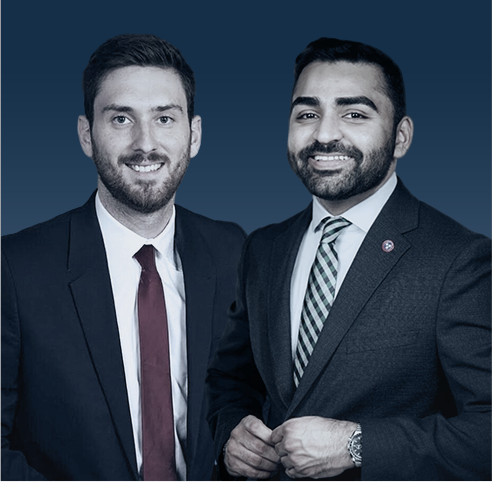Adjustment of Status | Green Card Applications | ABP LAW

Adjust your status to become a lawful permanent resident without leaving the U.S. ABP LAW helps clients with marriage-based green cards, family petitions, and employment-based AOS. Already in the U.S. and think you are eligible through a family relationship, marriage, employer sponsorship, or humanitarian program? We can help you adjust your status to become a lawful permanent resident and obtain your Green Card. We assist with preparing the I-485 application, gathering supporting documentation, responding to requests for evidence (RFEs)s, and preparing for your USCIS interview.
Common Scenarios We Handle:
- Marriage-based green cards
- Adjustment through U-Visa or VAWA approval
- Employment-based adjustments (with certified PERM or NIW)
Your Pathway to Permanent Residency with ABP Law
Obtaining lawful permanent residency—commonly known as a Green Card—is a critical step toward building a long-term future in the United States. A Green Card grants you the legal right to live and work in the U.S. indefinitely, providing stability, freedom, and the ability to eventually pursue U.S. citizenship. At ABP LAW, our experienced immigration attorneys are here to help you understand the Green Card process and guide you every step of the way. Because the Green Card process varies depending on your specific circumstances, our legal team provides personalized guidance based on your eligibility and goals. Whether you’re applying through a family member, employer, or another qualifying category, we are committed to making your journey toward permanent residency as clear and smooth as possible.
Who Is Eligible for a Green Card?
There are several categories through which a person may qualify for a Green Card. These include:
- Family-Based Sponsorship: Immediate relatives of U.S. citizens (spouses, unmarried children under 21, and parents) and other qualifying family members of U.S. citizens or Green Card holders.
- Employment-Based Immigration: Professionals, skilled workers, investors, and others with a qualifying job offer or exceptional abilities.
- Asylum or Refugee Status: Individuals granted asylum or admitted to the U.S. as refugees may apply for a Green Card after one year.
- Victims of Crime or Abuse: Individuals who qualify under programs such as VAWA (Violence Against Women Act), U-Visas (victims of crime), or T-Visas (victims of human trafficking).
- Special Immigrant Categories: Includes religious workers, juveniles who have been abused or abandoned, international broadcasters, and certain employees of international organizations or the U.S. government.
- Diversity Visa Lottery: Selected individuals from countries with low rates of immigration to the U.S. through the Diversity Immigrant Visa Program.
- Registry: For individuals who have lived continuously in the United States since before January 1, 1972.
Our attorneys will help determine the most appropriate immigration path based on your situation and guide you through the legal process with precision and care.
The Petition and Application Process
Most applicants begin the process when a qualifying relative or employer files an immigrant petition on their behalf. Depending on the category, this may involve forms such as:
- Form I-130 (Petition for Alien Relative)
- Form I-140 (Immigrant Petition for Alien Worker)
- Form I-360 (Self-petition under VAWA or as a Special Immigrant)
Once the petition is approved and a visa becomes available in your category, you may proceed with applying for permanent residency through either:
- Adjustment of Status (Form I-485): If you are currently in the U.S.
- Consular Processing: If you are outside the U.S., via a U.S. consulate in your home country
Our attorneys will assess your eligibility for adjustment of status versus consular processing and prepare a complete, well-documented application to reduce delays and increase your chances of approval.
Required Appointments and Biometrics
After submitting your adjustment of status application, you will be scheduled for a biometrics appointment at a local Application Support Center. There, your fingerprints, signature, and photograph will be taken. In some cases, USCIS may also require an in-person interview at your local field office.
If you are applying through consular processing, you will attend a visa interview at the appropriate U.S. embassy or consulate. We prepare our clients for these interviews with individualized coaching and detailed checklists to ease anxiety and ensure readiness.
Final Steps and Approval
Once all interviews and documentation are complete, USCIS or the U.S. consulate will issue a final decision. You may receive:
- Approval of your permanent resident status and Green Card issuance
- A Request for Evidence (RFE), requiring additional documents
- A denial, which we can help you appeal or address with supplemental filings
If granted, you will receive a physical Green Card and enjoy the rights of lawful permanent residents, including eligibility for work authorization, travel, and—after a qualifying period—U.S. citizenship.
What Makes ABP Law Different
Green Card applications are complex and high-stakes. At ABP LAW, we combine legal knowledge with compassionate advocacy to ensure your case receives the attention it deserves. Each case is assigned an experienced case manager who works closely with the attorney and the client to gather accurate documentation and ensure deadlines are met. We stay in regular contact throughout your case and prepare you thoroughly for each stage of the process, from forms and biometrics to interviews and requests for evidence. We advocate aggressively on your behalf and offer trusted legal strategies based on real results. Whether you’re pursuing a family-based petition, an employment-based opportunity, or humanitarian relief, ABP LAW is ready to be your legal partner in achieving permanent residency.
Get Started Today
If you’re ready to begin your Green Card application—or need help understanding your eligibility—contact ABP LAW to schedule a confidential consultation. Let us help you make the United States your permanent home.
Need Help?






